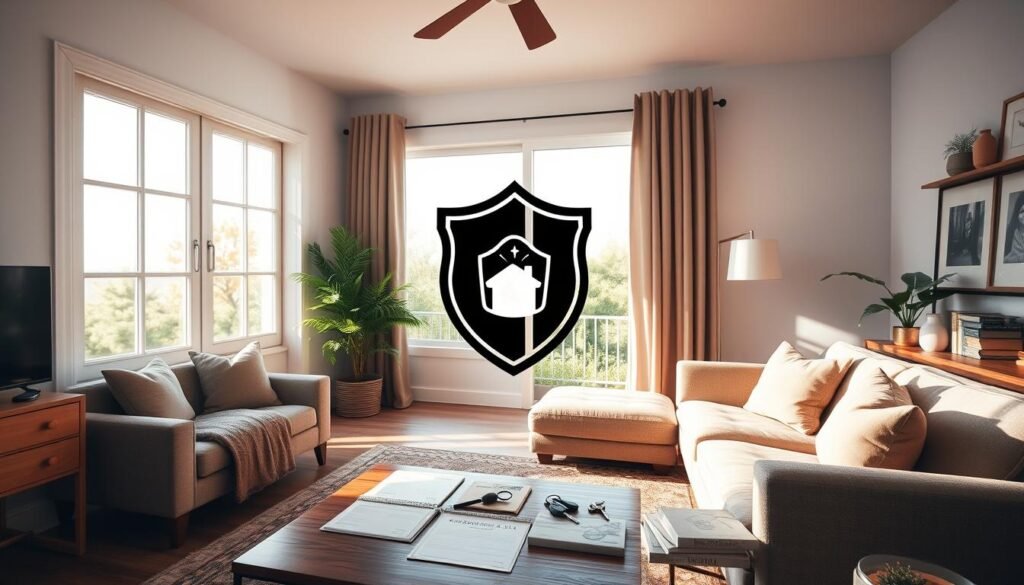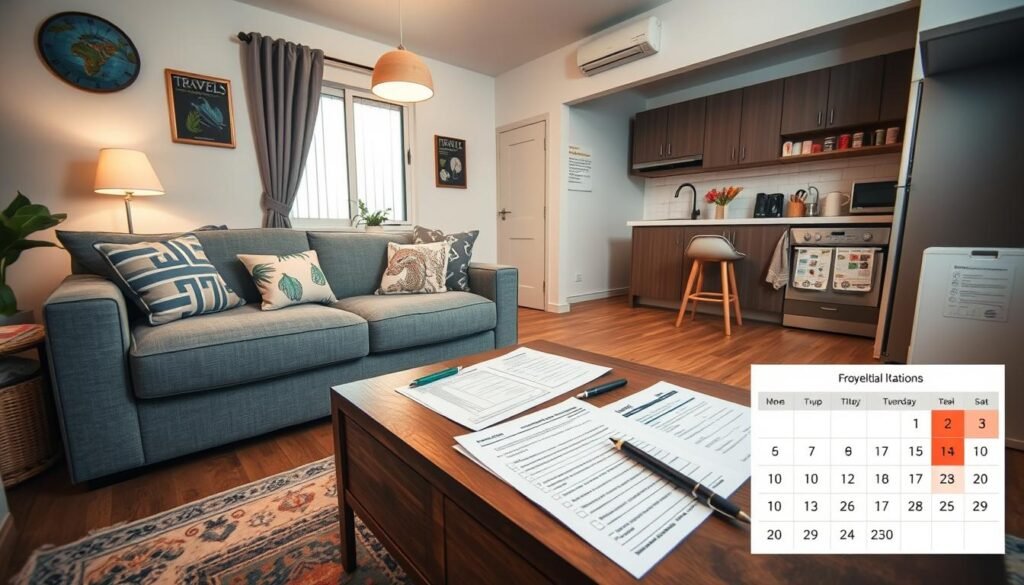Did you know that over 60% of Airbnb hosts in the United States operate without proper licensing or zoning permits? This staggering statistic underscores the critical need for short-term rental hosts to understand and navigate the complex legal landscape surrounding vacation rentals. From complying with local regulations to managing liability and tax implications, the legal considerations for successful short-term rental hosting are multifaceted and ever-evolving.
In this comprehensive guide, we’ll dive deep into the top legal factors that every short-term rental host must address to ensure a compliant, sustainable, and profitable hosting experience. Whether you’re a seasoned Airbnb host or just starting your vacation rental journey, staying informed on the latest vacation rental laws and Airbnb regulations is paramount to your long-term success in the home-sharing industry.
Key Takeaways
- Understanding and complying with local vacation rental laws is crucial for short-term rental hosts.
- Securing the necessary licenses, permits, and zoning approvals is essential to operate a legally compliant short-term rental business.
- Hosts must manage liability risks through comprehensive insurance coverage and well-crafted rental agreements.
- Navigating tax obligations, including sales tax and income tax reporting, is a critical aspect of short-term rental hosting.
- Staying informed on evolving Airbnb regulations and engaging with legal experts can help ensure long-term hosting success.
Understanding Short-Term Rental Regulations
As a short-term rental host, it’s essential to navigate the complex web of regulations governing your business. From local government laws to zoning requirements and licensing obligations, understanding these guidelines is crucial to avoiding legal issues and penalties.
Local Government Laws
Short-term rentals are subject to a variety of local laws and ordinances that can vary significantly from one municipality to another. Hosts must research and comply with regulations set by their city or county, which may include limitations on the number of rental days, occupancy restrictions, and specific tax requirements.
Zoning Requirements
Zoning laws are another critical factor to consider when operating a short-term rental. Certain areas may be designated for residential use only, prohibiting commercial activities like vacation rentals. Hosts must ensure their property is properly zoned for short-term rental purposes to avoid fines or legal action.
License and Permit Obligations
In addition to zoning compliance, short-term rental hosts are often required to obtain specific licenses and permits. This may include a business license, a vacation rental permit, or even a special-use permit. Failure to secure the necessary paperwork can result in significant penalties, so it’s crucial to stay informed and up-to-date on all licensing requirements.
| Regulation | Description | Potential Consequences |
|---|---|---|
| Zoning restrictions | Limitations on property use for short-term rentals | Fines, legal action, and possible shut down of rental |
| Permitting requirements | Licenses and permits needed to operate a short-term rental | Penalties for lack of proper documentation |
| Short-term rental taxes | Special taxes or fees imposed on vacation rental income | Audits, fines, and possible legal consequences for non-compliance |
By staying informed and proactively addressing these regulatory requirements, short-term rental hosts can ensure their business operates within the law and minimizes the risk of legal complications.
The Importance of Rental Agreements
When it comes to short-term rental hosting, the rental agreement is a critical document that protects both the host and the guest. This legally binding contract outlines the rights, responsibilities, and expectations of all parties involved, ensuring a smooth and safe experience for everyone.
Key Components of Rental Agreements
A comprehensive rental agreement should cover a range of essential elements, including the property rights, home-sharing compliance, and liability insurance provisions. Some key components to consider include:
- Clear check-in and check-out times
- Detailed description of the property and its amenities
- Policies around cleaning, damages, and security deposits
- Explicit rules and restrictions on guest behavior
- Liability clauses to protect the host and guests
Agreeing on House Rules
In addition to the legal framework, rental agreements should also outline the house rules that guests are expected to follow. These rules help maintain the property’s condition, ensure the safety of all occupants, and prevent any disruptions to the surrounding community. Common house rules may include:
- Quiet hours
- Smoking and pet policies
- Occupancy limits
- Prohibited activities (e.g., parties, events)
- Parking and transportation guidelines
Liability Clauses
Perhaps one of the most critical components of a rental agreement is the liability clause. This section outlines the host’s and guest’s responsibilities in the event of injuries, damages, or other unforeseen incidents. By clearly defining liability, hosts can protect their property rights and ensure compliance with local home-sharing regulations, while also securing the necessary liability insurance coverage.
“A well-crafted rental agreement can make all the difference in providing a safe, enjoyable, and legally compliant short-term rental experience for both hosts and guests.”

Liability Insurance Considerations
As a short-term rental host, understanding the importance of liability insurance is crucial. Adequate coverage can protect you from potential legal and financial liabilities that may arise from incidents involving your guests or your property. Let’s dive into the various types of insurance coverage, the significance of personal liability insurance, and strategies for safeguarding against guest injuries.
Types of Insurance Coverage
When it comes to short-term rentals, there are several types of insurance coverage to consider. These may include liability insurance, property damage coverage, and even specific Airbnb regulations that require certain insurance policies. It’s essential to review your options and select a comprehensive plan that aligns with your property rights and the unique needs of your short-term rental business.
Importance of Personal Liability Insurance
Personal liability insurance is a critical component of any short-term rental host’s protection plan. This coverage can shield you from financial liability in the event of guest injuries, property damage, or other incidents that may occur during their stay. By investing in a robust personal liability policy, you can safeguard your assets and ensure your Airbnb regulations are met.
Protecting Against Guest Injuries
Mitigating the risk of guest injuries is a top priority for short-term rental hosts. In addition to maintaining a well-kept and safe property, personal liability insurance can provide an additional layer of protection. This coverage can cover medical expenses, legal fees, and other costs associated with guest injuries, helping you avoid potentially devastating financial consequences.

Remember, the world of short-term rentals is constantly evolving, and it’s essential to stay informed about the latest Airbnb regulations and liability insurance requirements. By prioritizing comprehensive coverage and proactive risk management, you can create a sustainable and successful short-term rental business while protecting your property rights.
Tax Implications for Hosts
As a short-term rental host, navigating the tax landscape can be a crucial yet complex aspect of your business. From collecting sales tax to reporting income and claiming deductions, it’s essential to stay compliant with local and federal regulations. This section explores the key tax considerations that short-term rental hosts must keep in mind.
Sales Tax Regulations
Depending on your location, you may be required to collect and remit sales tax on bookings made through your short-term rental. This can vary widely based on state and local laws, so it’s important to research the specific requirements in your area. Keeping detailed records of your rental income and sales tax collected is crucial to ensure you meet your tax obligations.
Income Tax Reporting
Income generated from your short-term rental must be reported on your personal income tax return. This includes revenue from bookings, as well as any associated fees or charges. Accurate record-keeping is essential to properly calculate your taxable income and avoid any potential issues with the Internal Revenue Service (IRS).
Deductions for Expenses
- Mortgage or rent payments
- Utilities (electricity, water, gas)
- Cleaning and maintenance supplies
- Repairs and renovations
- Insurance premiums
- Marketing and advertising costs
As a short-term rental host, you may be able to deduct a portion of your expenses related to operating your vacation rental. This can help offset your taxable income and maximize your profitability. Be sure to consult with a tax professional to ensure you’re taking advantage of all eligible deductions.

Staying on top of the short-term rental taxes, vacation rental laws, and home-sharing compliance requirements is crucial for short-term rental hosts. By understanding and adhering to the relevant tax regulations, you can ensure a sustainable and compliant hosting environment for your business.
Safety Regulations to Comply With
As a short-term rental host, it’s crucial to adhere to the safety regulations set forth by local authorities and Airbnb regulations. Ensuring the safety and well-being of your guests should be a top priority, as it not only protects them but also safeguards your property rights.
Smoke and Carbon Monoxide Detectors
One of the fundamental safety requirements for short-term rentals is the installation of functioning smoke and carbon monoxide detectors. These life-saving devices must be properly installed and regularly tested to ensure they are in working order. Neglecting this crucial permitting requirement can lead to severe consequences, both for your guests and your hosting responsibilities.
Health and Safety Inspections
Periodic health and safety inspections are often mandated by local governments or Airbnb regulations. These inspections ensure your rental property meets established standards for fire safety, sanitation, and overall livability. Preparing for and passing these inspections demonstrates your commitment to providing a safe and compliant environment for your guests.
Accessibility Compliance
Accommodating guests with disabilities is not only the right thing to do but is also often a legal requirement. Ensuring your short-term rental is accessible, with features such as ramps, wide doorways, and adjustable fixtures, demonstrates your dedication to inclusive Airbnb regulations. This not only enhances the guest experience but also protects your property rights by avoiding potential legal issues.

By prioritizing safety and complying with the necessary permitting requirements, short-term rental hosts can create a secure and welcoming environment for their guests, while also safeguarding their own property rights. Staying informed and proactive about safety regulations is a crucial aspect of being a responsible and successful short-term rental host.
Tenant Rights and Responsibilities
In the world of short-term rentals, understanding the rights and responsibilities of both hosts and tenants is paramount. This section delves into the intricacies of tenant relations, eviction procedures, and security deposit regulations, ensuring a fair and legal experience for all parties involved.
Understanding Tenant Relations
Establishing a positive rapport with your tenants is crucial for maintaining a successful short-term rental operation. Effective communication, clear expectations, and a mutual respect for property rights can go a long way in fostering a harmonious hosting environment. Hosts must be mindful of tenant privacy and autonomy while also ensuring compliance with local vacation rental laws.
Eviction Procedures
In the rare event that a tenant violates the terms of the rental agreement, hosts may need to consider the eviction process. It is essential to familiarize yourself with the home-sharing compliance regulations in your area, as the process can vary significantly depending on local jurisdictions. Proper documentation, adherence to legal procedures, and sensitivity to the tenant’s rights are crucial throughout the eviction process.
Security Deposit Regulations
The management of security deposits is a critical aspect of short-term rental operations. Hosts must be well-versed in the applicable property rights laws and regulations governing the handling and refund of security deposits. Clearly outlining deposit policies, timely return of funds, and proper documentation can help mitigate potential disputes and ensure a smooth experience for all involved.

“Establishing a strong, mutually respectful relationship with your tenants is the foundation for a successful short-term rental experience.”
Impact of Homeowners Associations (HOA)
For short-term rental hosts, understanding the role of Homeowners Associations (HOAs) is crucial. HOAs often have specific rules and restrictions that can significantly impact your property rights and home-sharing compliance. Navigating these regulations is essential for avoiding potential conflicts and ensuring a sustainable hosting environment.
HOA Rules and Restrictions
Many HOAs have strict guidelines regarding short-term rentals, including limitations on the number of days a property can be rented out, restrictions on the type of guests allowed, and even outright bans on home-sharing activities. As a host, it’s vital to familiarize yourself with your HOA’s covenants and bylaws to ensure you’re in full compliance with these zoning restrictions.
Handling HOA Violations
If you find yourself in violation of your HOA’s rules, it’s important to address the issue promptly. This may involve engaging in open communication with your HOA board, providing necessary documentation, and taking remedial actions to rectify the situation. Failure to do so could result in fines, legal action, or even the termination of your short-term rental operations.
Benefits of HOA Membership
While HOA regulations can present challenges for short-term rental hosts, there are also potential benefits to being an active member of your homeowners association. HOAs can provide valuable resources, such as guidance on property management, access to shared amenities, and a framework for addressing community concerns. Engaging with your HOA can help you maintain positive relationships with your neighbors and ensure the long-term sustainability of your hosting endeavors.

“As a short-term rental host, it’s crucial to understand and comply with your HOA’s rules and regulations to avoid potential conflicts and ensure a seamless hosting experience.”
The Role of Online Platforms
As the short-term rental industry continues to evolve, the role of online platforms like Airbnb and VRBO has become increasingly significant. These platforms not only facilitate the listing and booking process but also play a crucial part in ensuring compliance with Airbnb regulations, vacation rental laws, and overall home-sharing compliance.
Airbnb and VRBO Policies
Hosts must familiarize themselves with the specific policies and guidelines set forth by each platform. From registration requirements to tax obligations, understanding these platform-specific rules is essential for maintaining a successful and compliant short-term rental operation. Regular monitoring of policy updates is crucial to stay ahead of any changes that may impact the hosting experience.
Dispute Resolution Processes
Inevitably, disputes may arise between hosts and guests during the rental process. Both Airbnb and VRBO have established dispute resolution mechanisms to address such issues. Hosts should be well-versed in these processes to ensure a fair and transparent approach to handling any conflicts or concerns that may arise.
Responsibilities of Hosts
- Ensure compliance with all platform-specific policies and local vacation rental laws.
- Respond promptly to guest inquiries and maintain clear communication throughout the rental period.
- Maintain a high level of cleanliness and safety standards in the rental property.
- Provide accurate and detailed information in the listing to set appropriate guest expectations.
- Handle any disputes or complaints in a professional and timely manner, following the platform’s dispute resolution guidelines.
By understanding the role of online platforms and fulfilling their responsibilities as hosts, short-term rental operators can create a sustainable and successful hosting environment that benefits both themselves and their guests.

| Platform | Key Policies | Dispute Resolution |
|---|---|---|
| Airbnb |
|
|
| VRBO |
|
|
Neighborhood and Community Engagement
As a short-term rental host, building strong relationships with your local community is crucial. Maintaining positive engagement with neighbors and the surrounding neighborhood not only helps mitigate potential issues, but it also creates a more sustainable hosting environment that benefits everyone involved.
Building Good Relationships
It’s important to be a considerate and proactive neighbor. This includes being mindful of noise ordinances, respecting property rights, and ensuring your guests comply with local home-sharing compliance regulations. Take the time to introduce yourself to nearby residents and establish open communication channels. Invite your neighbors to provide feedback and address any concerns they may have.
Hosting Lasting Experiences
By creating memorable and positive experiences for your guests, you can foster a sense of community engagement. Encourage your guests to explore local businesses, participate in community events, and be respectful of the neighborhood. This not only enhances your guests’ stay but also contributes to the overall vibrancy of the local community.
Managing Neighbor Complaints
Despite your best efforts, there may be instances where you need to address noise ordinances or other neighbor complaints. Respond promptly and professionally, and work to find a mutually agreeable solution. Be transparent about your property rights and the steps you’re taking to maintain compliance, while also demonstrating empathy and a willingness to find a resolution.
Ultimately, by prioritizing neighborhood and community engagement, you can create a more sustainable short-term rental business that benefits both your guests and the local community.
Marketing Your Short-Term Rental
As short-term rental hosts, it’s crucial to understand the legal considerations surrounding the marketing and advertising of your vacation property. Adhering to vacation rental laws, Airbnb regulations, and home-sharing compliance requirements can help ensure your business practices are ethical and transparent.
Ethical Advertising Practices
When promoting your short-term rental, it’s essential to adopt ethical advertising practices. This includes accurately representing your property’s amenities, capacity, and availability. Avoid making false or misleading claims that could potentially violate vacation rental laws or Airbnb’s policies.
Privacy Considerations
Respecting your guests’ privacy is another crucial aspect of marketing your short-term rental. Ensure that any information you share about your property, such as photographs or descriptions, does not compromise the privacy and security of your guests. Familiarize yourself with Airbnb regulations and other relevant home-sharing compliance guidelines to protect your guests’ personal data.
Representing Your Property Truthfully
When showcasing your short-term rental, it’s essential to represent your property truthfully and accurately. This means providing clear, detailed, and up-to-date information about your rental’s features, amenities, and policies. Misrepresenting your property could lead to legal issues or negative guest experiences, potentially damaging your reputation and business.
By staying informed about vacation rental laws, Airbnb regulations, and home-sharing compliance requirements, you can effectively market your short-term rental while maintaining ethical practices and protecting your guests’ privacy. Prioritizing transparency and truthfulness in your advertising will help you build a sustainable and successful hosting business.

Preparing for Audits and Inspections
As a short-term rental host, it’s crucial to be prepared for potential audits and inspections from local authorities. Staying ahead of the curve when it comes to permitting requirements, short-term rental taxes, and home-sharing compliance can save you from headaches down the line.
Understanding the Audit Process
Audits and inspections are often conducted to ensure hosts are adhering to local laws and regulations. This typically involves providing documentation related to your rental activities, including financial records, guest logs, and any relevant permits or licenses. It’s important to be transparent and cooperative during the audit process to demonstrate your commitment to compliance.
Required Documentation
- Copies of all required licenses and permits, such as business licenses, short-term rental permits, and occupancy tax registrations.
- Detailed financial records, including income and expense reports, payment records, and tax filings.
- Guest registration logs, including names, dates of stay, and contact information.
- Proof of compliance with local safety regulations, such as fire extinguisher and smoke detector inspection reports.
How to Prepare Your Property
In addition to having the necessary documentation in order, it’s important to ensure your property is ready for inspection. This may include:
- Conducting a thorough cleaning and safety check to address any potential issues.
- Reviewing your property’s compliance with local zoning laws, building codes, and accessibility requirements.
- Familiarizing yourself with the specific inspection criteria and guidelines in your area.
By proactively preparing for audits and inspections, you can demonstrate your commitment to responsible short-term rental hosting and avoid any potential penalties or fines. Being informed and organized will help you navigate the compliance landscape with confidence.

Keeping Updated with Legal Changes
As a short-term rental host, it’s crucial to stay informed about the ever-evolving vacation rental laws, Airbnb regulations, and home-sharing compliance requirements in your local area. Compliance is not only essential for avoiding fines or legal issues but also crucial for maintaining a positive reputation and ensuring a sustainable hosting environment.
Importance of Compliance
Complying with the latest vacation rental laws and Airbnb regulations demonstrates your commitment to responsible hosting. It not only protects you from potential legal consequences but also helps build trust with your guests and the local community.
Resources for Staying Informed
To stay up-to-date with the home-sharing compliance requirements, consider subscribing to industry newsletters, monitoring local government websites, and joining online forums or host communities. These resources can provide valuable insights and timely updates on any changes in the regulatory landscape.
Engaging Legal Experts
When navigating complex vacation rental laws and Airbnb regulations, it may be beneficial to consult with legal experts who specialize in the short-term rental industry. These professionals can provide valuable guidance and ensure your hosting practices remain compliant with the latest home-sharing compliance requirements.

“Staying informed and compliant with the ever-changing regulations is essential for the long-term success and sustainability of your short-term rental business.”
Conclusion: Creating a Sustainable Hosting Environment
As a short-term rental host, navigating the legal complexities surrounding the industry is crucial for maintaining a sustainable and compliant operation. By understanding the top legal considerations, such as the Top Legal Considerations for Short-Term Rental Hosts, hosts can ensure their property rights are protected while adhering to local regulations and best practices.
Maintaining home-sharing compliance is essential for avoiding potential legal issues and preserving positive relationships with local authorities, homeowners associations, and the surrounding community. Regularly staying informed about evolving laws and regulations, as well as engaging with legal experts when necessary, will help hosts adapt and thrive in the ever-changing short-term rental landscape.
Ultimately, creating a sustainable hosting environment requires a proactive and diligent approach to property rights and legal compliance. By prioritizing these factors, short-term rental hosts can provide exceptional experiences for their guests while contributing positively to the communities they serve.
FAQ
What are the key local government laws that short-term rental hosts need to be aware of?
Short-term rental hosts must research and comply with local government laws, which can include zoning restrictions, license and permit requirements, and regulations on tax collection and reporting.
Why is it important to have a comprehensive rental agreement in place?
A well-crafted rental agreement can help mitigate legal risks by clearly outlining the terms, house rules, and liability clauses for both the host and the guest.
What types of insurance coverage are essential for short-term rental hosts?
Short-term rental hosts should consider obtaining personal liability insurance, property damage coverage, and potentially additional policies to protect against guest injuries or property damage.
What are the key tax obligations for short-term rental hosts?
Short-term rental hosts must comply with sales tax regulations, accurately report income tax, and be aware of potential deductions for rental-related expenses.
What safety regulations must short-term rental hosts comply with?
Short-term rental hosts are typically required to install smoke and carbon monoxide detectors, undergo health and safety inspections, and ensure accessibility compliance for guests with disabilities.
How do Homeowners Associations (HOAs) impact short-term rentals?
Short-term rental hosts must understand and comply with any HOA rules and restrictions, which may include limitations on the number of rental days or specific requirements for hosting.
What are the responsibilities of short-term rental hosts when using online platforms like Airbnb or VRBO?
Hosts must familiarize themselves with the policies and dispute resolution processes of the platforms they use, and ensure they are meeting their responsibilities to maintain compliance.
How can short-term rental hosts build positive relationships with their local community?
Hosts can engage with their neighbors, manage noise complaints effectively, and create positive experiences for guests to foster goodwill within the community.
What are the legal considerations for marketing short-term rentals?
Hosts must ensure their advertising practices are ethical, respect guest privacy, and accurately represent their property to avoid potential legal issues.
How can short-term rental hosts prepare for audits and inspections?
Hosts should understand the audit process, maintain required documentation, and proactively prepare their property to ensure compliance with local regulations and tax laws.
Why is it important for short-term rental hosts to stay informed about legal changes?
Compliance with evolving regulations is crucial, and hosts should utilize resources to stay up-to-date and engage legal experts when necessary to navigate the changing landscape of short-term rental laws.



